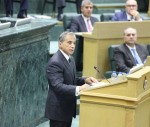You are here
Translation and anxiety about self-image, identity in the Arab world
May 09,2023 - Last updated at May 09,2023
Arab intellectuals and practitioners of translation in the age of globalization are exerting strenuous efforts to initiate an organized large-scale translation activity from Arabic into foreign languages and vice versa, activity inspired by the sweeping force of cross-cultural interaction and communication in the age of globalisation. In addition to its traditional role as a means of promoting cross culture communication and transmitting knowledge and information, translation, particularly from Arabic into foreign languages at the present time in the Arab World is conceived as an effective medium to project a genuine or authentic image of Arabs culture. That is in an attempt to rectify growing misrepresentations of Arab culture and their image especially in the West in the aftermath of the tragic event of the eleventh of September.
It is often maintained that translation of the Arab culture production into English has always tended to confirm pre-existing Western prejudice based mainly on orientalist assumptions about the orient in general and the Arab World in particular. Another important claim is that foreign (mainly western translators) from Arabic into English usually produce manipulated target language texts which reflect ideological moral values privileged in the West, thus acting in violation of the moral values and indigenous thoughts presented in the source language text. Hence, the major concern of Arab intellectuals and translators to take full responsibility for translating activity, thus acting as, in the terminology of Andrere Lefevere (a well known translation theorist) the’ patrons’of translation.
It is in this context that PROTA ( The Project of Translation from Arabic Literature) has been established. The project is an attempt on the part of Arab intellectuals to serve Arab aspirations for better representation of their culture in the West, representation liberated from ehnocentricity, pre-existing prejudice, and stereotyping which traditionally control representation of the Arab in the West. Here is how Salma Jayyusi, who plays a major role in the establishment of PROTA, sums up the objectives of the first published anthology of Arab literary works translated into English by PROTA.
This anthology will complete everyone's picture of the area and deepen their understanding of its people, as well as of the spirit that directs the way they look at, and interact with, the world. I believe that the best way people on the outside can truly and fully discover Arabia's hidden conscience, its motivating impulse, its generosity, its pride, idealism and supreme dignity, is through reading its literature. It is then, through such an acquired familiarity with experiences, the sentiments, the ideals and visions of Arabia's authors, that rigid stereotypes will be fractured and replaced with valid realities.











